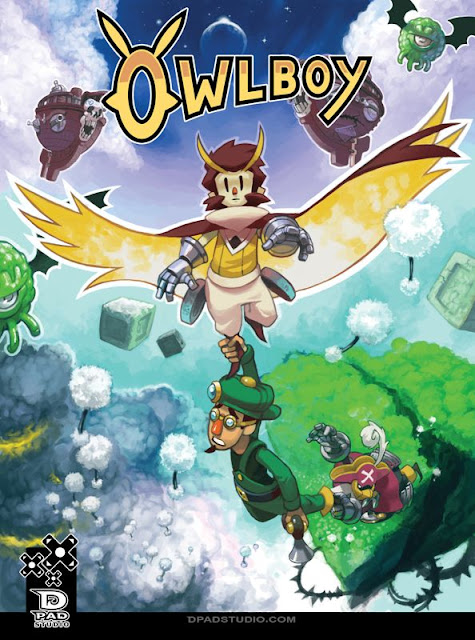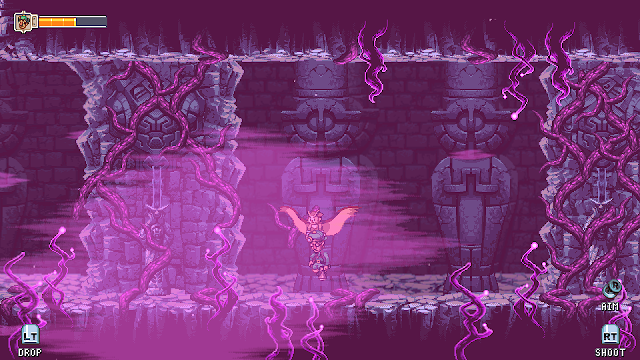SINS OF THE FEATHER
Owlboy is a mostly forgotten indie gem from Norwegian developer D-Pad Studio. It’s only the second time I’ve controlled an owl as a protagonist in a game—the first being the Amiga-exclusive horizontal shooter Agony from 1992. Despite the decades between them, the two share a striking visual sensibility: richly detailed backgrounds that quietly tell stories of their own. Their worlds feel alive and mysterious, expanding in the player’s imagination long after the screen goes dark.
At a glance, Agony and Owlboy could be mistaken for products of the same era. But beneath its classic, colorful façade, Owlboy is unmistakably modern. It blends genre elements in ways old-school shooters never did. It’s a side-scrolling platformer with very little jumping, and a metroidvania with limited exploration. A soothing soundtrack perfectly captures the freedom of flight. The game reportedly spent nearly ten years in development, but pixel art of this quality never grows old—Owlboy possesses a quiet timelessness.
The game’s breezy world consists of islands floating high in the sky. You flap through open blue expanses and squeeze through claustrophobic dungeons. The path forward is blocked—perhaps you need to locate a switch or pressure plate. The gate opens and suddenly you’ve stumbled into an enemy base, calling for stealth. You’re spotted, guns come out, and soon you’re fleeing through spikes and traps in search of an exit. Eventually, you return home to your village to upgrade equipment and “talk” to your friends.
If only you could talk.
As the titular owlboy, Otus is mute. I’m usually not fond of silent protagonists, but here it works remarkably well. Through expressive animation, Otus’ body language and facial expressions convey insecurity, determination, and vulnerability. He’s portrayed as a troubled youngster with social anxiety, shaped by the cruelty of his strict owl mentor, Asio. This dynamic is established powerfully in the opening nightmare sequence, which sets the emotional tone for the entire game.
The story carries comic-book seriousness beneath its bright, playful surface. It begins with Otus’ home village being invaded by a band of pirates terrorizing the world in search of ancient relics of immeasurable power. Teaming up with his best friend Geddy, Otus sets out to stop them. Along the way, the narrative reveals the owls’ dubious history of meddling with natural forces. The supposedly wise guardians may, in fact, be architects of their own downfall.
Geddy hangs from Otus’ talons and serves as your primary weapon. At key points, new companions join the party, each providing a distinct firearm with unique properties. A clever teleportation device allows you to summon and swap companions instantly. Geddy’s peashooter is reliable, but later weapons include a powerful shotgun and a sticky gun, each doubling as a puzzle-solving tool.
Every major area culminates in a boss fight. While none are particularly memorable or challenging, they encourage creative use of your limited moveset: dashing to avoid fire, spinning attacks, throwing objects, and choosing the right companion for the job. The aiming lacks precision, but the large sprites make this a non-issue. I defeated most bosses on my first attempt, often with only a sliver of health remaining. Thankfully, Otus can recover by eating berries and turnips scattered throughout the world.
The cast—made up of humans and anthropomorphic animals—is charming, but largely underdeveloped. Several story threads simply fade away. A hinted romance between Geddy and a female villager goes nowhere. Early bullies Fib and Bonacci disappear from the narrative. Even the final boss isn’t the one the story seems to build toward. When the credits rolled, I genuinely wondered if I’d missed some crucial collectibles and locked myself out of a “true” ending.
Exploration never triggered any fear of missing out, largely because there isn’t much of consequence to discover. Coins found in buried chests or Superman 64-esque rings can be exchanged for cosmetic items or minor, non-essential upgrades back in the village. Like many retro-inspired games, Owlboy works beautifully as a palate cleanser between sprawling open-world epics. It’s charming, atmospheric, and surprisingly compact—though my GOG Galaxy client claims I played for exactly 11 hours, which feels oddly long.
What makes Owlboy so captivating is its simplicity. Nothing here is truly novel, but everything is expertly crafted. The pacing is excellent, the controls responsive, and the gameplay shifts just often enough to stay fresh without overstaying its welcome. No section feels broken or tedious. The game challenges both reflexes and problem-solving skills, and while its narrative doesn’t quite stick the landing, the journey itself is consistently rewarding.
There’s a quiet poetry to a game about flight that never once stumbles.








Comments
Post a Comment